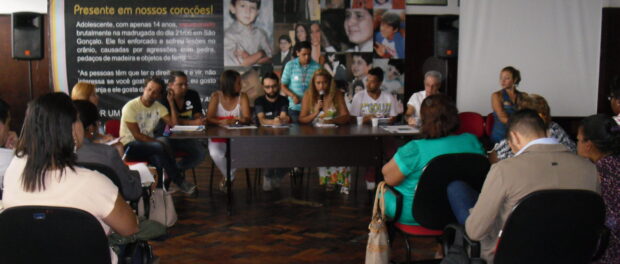
This month, LGBT leaders from several favelas in Rio de Janeiro gathered to discuss the current state of LGBT rights in Rio communities.
The Rio Communities LGBT Meet-Up took place on December 10 in the Adauto Belarmino Auditorium in Central do Brasil with the participation of about 60 people of all ages.
Fernando Veloso, chief of Rio’s Civil Police, made a brief appearance and spoke first. He assured the attendees LGBT issues are on his department’s radar, and training for police officers regarding how to respectfully approach LGBT residents is underway.
“Our mission is not to arrest you,” Velozo told the crowd. “Our mission is to secure your rights.”
Claudio Nascimento, coordinator of Rio Sem Homofobia (Rio Without Homophobia), officially commenced the event with a brief introduction of the meaning of sexuality, homophobia and citizenship. The purpose of the event, he said, was to identify the most common problems faced by the LGBT community in favelas and debate solutions.
He said Rio Sem Homofobia is looking to develop more projects in favelas and will begin establishing LGBT centers in several communities. The goal, he said, is to tackle homophobia and transphobia and to make sure the LGBT community does not continue to be neglected by public programs such as Bolsa Família.
Nascimento’s presentation was followed by a roundtable discussion among community leaders from Complexo da Maré, Complexo do Borel, Comunidade Mato Alto, Complexo do Alemão, Complexo da Penha, Cidade de Deus, Cidade Alta, and Cinco Bocas. Each leader painted a picture of what life is like for them in their community and described human rights projects they initiated or collaborated with to improve the quality of life for members of the LGBT community.
Laura Mendes, for example, works for a group called Além do Arco-Íris (Beyond the Rainbow), a project sponsored by AfroReggae that offers a meeting point for transgender people in Rio to discuss psychology, advocacy, medicine and international relations. It also offers help finding employment options and working through the process to acquire a “social name” under law.
Mendes described a chilling story about her struggles growing up as a transgender person without understanding parents and in an intolerant society. She said she lived “in the shadows” for a long time, spent a period of her life behind bars, where discrimination was just as hurtful. However, her life turned around when she was finally given a chance and offered a job.
“Everyone has the right to live,” Mendes said. “If you give us transvestites and transexuals just one opportunity, one chance.”
Several leaders identified the most pressing issues for the LGBT community and the most common included the lack of courteous and indiscriminating medical treatment, of employment opportunities, of government participation in dispelling stereotypes and tackling public intolerance specifically in favelas.
Carla Silva, from Complexo do Borel, said she has had uncomfortable experiences with health workers who are not properly trained to serve the LGBT community. She said perhaps the government should conduct seminars with them and spark dialogue about how to respectfully approach an LGBT patient.
“They should train health professionals a lot more,” she said. “A lot of times, LGBT community members are embarrassed to enter a clinic or speak to a doctor.”
Mauro Lima Dos Santos from Complexo da Maré said the LGBT communities in favelas struggle to be recognized. Many times, he said, they build “their own favela within the favela” for fear of discrimination and violence.
Following the roundtable discussion, the audience was asked to participate in smaller discussion groups to debate problems and solutions for the LGBT community. Each group then presented a list of issues and propositions to another table of 12 government leaders including: João Mariano, Human Rights and Social Assistance Secretary of State; Denise Pires, from the State Department of Health; and Julio Moreira, president of the LGBT Council of Rio de Janeiro.
Nascimento then concluded the seminar by thanking all guests and the audience for attending. He also said he hoped another seminar could be held in the future to benchmark the progress in each community.
“There are ways out, there are solutions, and together we can build those solutions,” he said.
Last Saturday, Luiz Antônio de Moura, 41, LGBT community leader in Complexo de Alemão was assassinated. The motives behind the assassination have not been confirmed by police, but Nascimento has reportedly said he was informed that Moura’s death could’ve been due to his support of the UPP in the favela.

